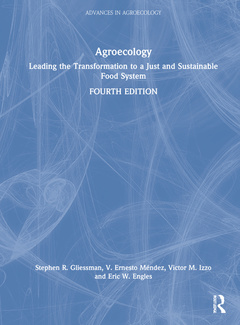Agroecology (4th Ed.) Leading the Transformation to a Just and Sustainable Food System Advances in Agroecology Series
Auteurs : Gliessman Stephen R., Méndez V. Ernesto, Izzo Victor M., Engles Eric W.

Agroecology is at the forefront of transforming our food systems. This bestselling textbook provides the essential foundation for understanding this transformation in all its components: agricultural, ecological, economic, social, cultural, and political. It presents a case for food system change, explains the principles and practices underlying the ecological approach to food production, and lays out a vision for a food system based on equity and greater compatibility with the planet?s life support systems. New to the fourth edition:
- A chapter on Alternatives to Industrial Agriculture, covering the similarities and distinctions among different approaches to sustainable agriculture
- A chapter on Ecological Pest, Weed, and Disease Management
- A chapter on Urban and Peri-urban Agriculture
- A chapter on Agriculture and the Climate Crisis
- A revised analysis and critique of the food system?s embeddedness in the extractive capitalist world economy that reflects ideas in the emerging field of political agroecology
- Streamlined treatment of agroecology?s foundations in ecological science, making the text more compatible with typical course curricula
A Companion Website at https://routledgetextbooks.com/textbooks/9781032187105/ incorporates the entire contents of the updated practical manual Field and Laboratory Investigations in Agroecology, split into student and lecturer resources. These 24 sample investigations facilitate hands-on learning that involves close observation, creative interpretation, and constant questioning of findings.
Groundbreaking in its first edition and established as the definitive text in its second and third, the fourth edition of Agroecology captures recent developments in the field and forcefully applies the idea that agroecology is a science, a movement, and a practice. Written by a team of experts, this book will encourage students and practitioners to consider the critical importance of transitioning to a new paradigm for food and agriculture.
Foreword
Preface 1
Preface 2
Authors
Recommendations for Using this Textbook
Section I • Pathway to Agroecology
1 The Case for Fundamental Change in Agriculture
2 Alternatives to Industrial Agriculture
3 The Agroecosystem Concept
Section II • Agricultural Organisms and their Environment
4 The Plant: Nutrition, Growth, and Response to the Environment
5 Light
6 Climatic Factors Affecting Plants
7 Biotic Factors and Interactions among Organisms
8 The Soil Ecosystem
9 The Environmental Complex
Section III • System-Level Interactions
10 Population Ecology of Agroecosystems
11 Genetic Resources in Agroecosystems
12 Species Interactions in Crop Communities
13 Agroecosystem Diversity
14 Ecological Pest, Weed, and Disease Management
15 Successional Development and Agroforestry
16 Animals in Agroecosystems
17 Energetics of Agroecosystems
18 Landscape Diversity
Section IV • Agroecological Farms and Communities
19 Sustainability and Its Assessment
20 Converting Farms to Ecologically Based Management
21 Bringing Farmers and Consumers Closer Together
22 Urban and Peri-urban Agriculture
Section V • Transforming the Global Food System
23 Achieving a Just and Sustainable Food System
24 Economic Dynamics of the Food System
25 Agriculture and the Climate Crisis
26 Shaping the Future in the Present
Glossary
References
Index
With graduate degrees in Botany and Ecology from the University of California, Santa Barbara, Stephen (Steve) R. Gliessman has accumulated more than 50 years of teaching, research, and production experience in the field of agroecology. His international experiences in tropical and temperate agriculture, small-farm and large-farm systems, traditional and conventional farm management, hands-on and academic activities, non-profit and business employment, and organic farming have provided a unique combination of experiences and perspectives to incorporate into this book. He was the founding director of the University of California, Santa Cruz, Agroecology Program, one of the first formal agroecology programs in the world, and was the Alfred and Ruth Heller Professor of Agroecology in the Department of Environmental Studies at UCSC until his retirement in 2012. He is the co-founder of the non-profit Community Agroecology Network (CAN) and currently serves on its board of directors. He is the editor of the international journal Agroecology and Sustainable Food Systems and dry farms organic wine grapes and olives with his wife Robbie in northern Santa Barbara County, California.
V. Ernesto Méndez is Professor of Agroecology and Environmental Studies at the University of Vermont’s (UVM) Environmental Program and Department of Plant and Soil Science, where he also co-directs the Agroecology and Livelihoods Collaborative (ALC) with Martha Caswell. With degrees in Crop Science, Tropical Agroforestry, and Agroecology, he focuses his research and teaching on agroecology, agri-food systems, participatory action research (PAR), coffee agroecology, transdisciplinary research approaches, and social justice. At UVM he is also a faculty member of the Food Systems Graduate Program, fellow and steering committee member of the Gund Institute for Environment. He has more than 25 years of experience working with smallholder farmers and Indigenous communities in Lati
Date de parution : 09-2022
21x28 cm
Thèmes d’Agroecology :
Mots-clés :
Food System; Vice Versa; Sustainable Food System; C4 Photosynthesis; C3 Plant; Land Equivalent Ratio; Industrial Food System; Alternative Food Networks; Cover Cropping; Food System Change; Agri Food System; UN; Soil Fertility; Cropping System; Soil Management; Food System Transformation; Global Food System; Complementary Pathways; GE Crop; Soil Quality; GE Organism; Allelopathic Compounds; Removal Interferences; C4 Plant; Total LER



